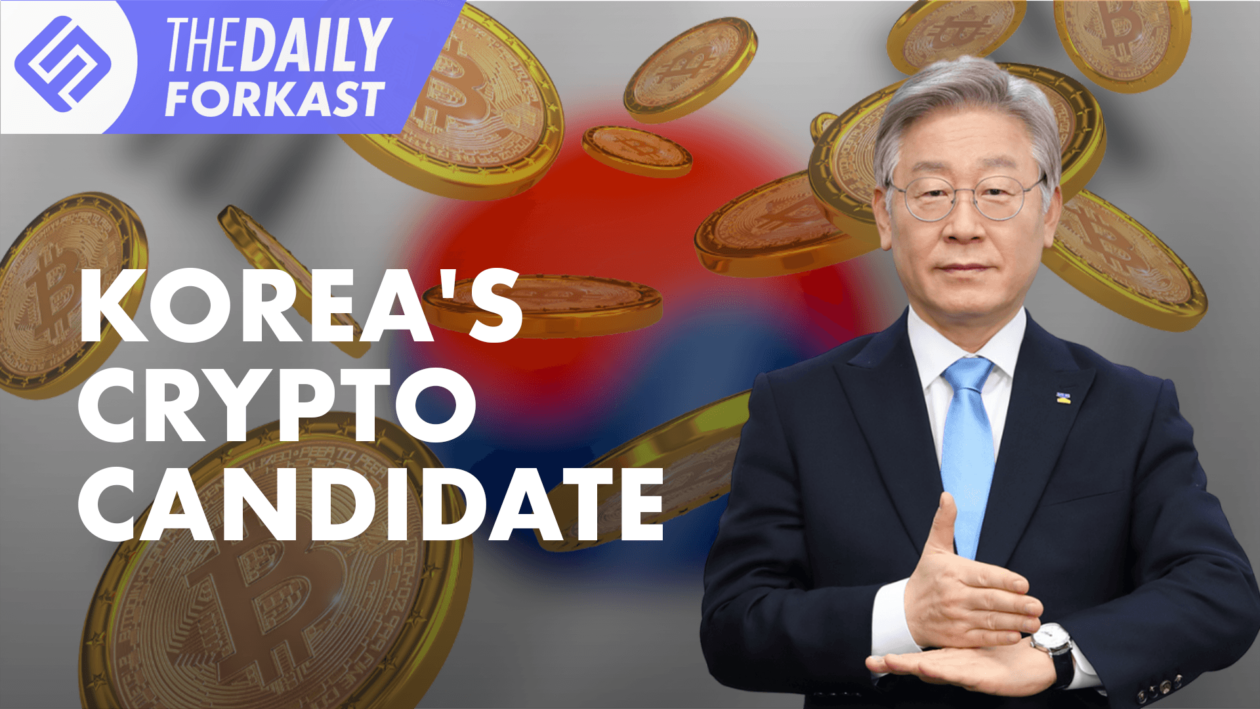China’s e-CNY makes Double 11 shopping extravaganza debut.
Russia looks to legalize crypto mining.
Korean presidential candidate Lee Jae-myung goes all out on crypto.
We’ll have more on those stories — and other news shaping the cryptocurrency and blockchain world — in this episode of The Daily Forkast November 12.
Transcript
Crypto mining regulation is hitting the headlines today.
Welcome to The Daily Forkast November 12, 2021. I’m Megha Chaddah for Forkast.News, covering all things blockchain. Filling in for Editor-in-Chief Angie Lau.
Russia, which is the world’s third largest crypto mining country by share of global hashrate, is looking to legalize the industry. We’ll take a look at what that could mean for the government’s tax coffers and a whole lot more coming up.
Let’s get you up to speed from Asia to the world.
Let’s kick off with some of the top stories out of Asia today.
First up, China’s double 11 or Singles Day, not only celebrates those who are single, but it’s also the country’s biggest shopping festival, bigger than Black Friday or Cyber Monday in the US.
And this year saw the first time payments could be made using the e-CNY. Retail giant JD.com said more than 100,000 shoppers placed over 240,000 orders using it.
In the past, both JD.com and Alibaba’s Tmall e-commerce platforms have broadcast hourly sales numbers.
However, despite that not happening this time around, the event still broke records, with JD.com total sales 28% higher than last year while Tmall’s were 8% higher.
And in South Korea, a third crypto exchange has gained its official license. Coinone follows Upbit and Korbit.
That leaves Bithumb as the only exchange out of the big four in the country that has submitted its full compliance report to the authorities but has not been registered. The reason for Bitthumb’s prolonged review has not been revealed.
However, local media outlets have suggested that one of Bithumb’s major shareholders being on trial for fraud charges may have some influence.
You can find more on those stories at Forkast.News.
Over in Russia, the government is looking to legalize the crypto mining industry.
Parliamentarian Andrei Lugovoi proposed the creation of a working group to discuss the issue after saying that miners are not paying any taxes on their earnings, which he put at a massive US$2 billion per year.
Forkast.News Timmy Shen reports.
The first deputy chairman of Russia’s Committee on Security and Anti-Corruption said the miners are making that US$2 billion at the expense of Russia’s people. And that without regulation in place, law enforcement agencies struggle to establish whether any crimes are being committed.
Well, Lugovoi also said he has regulation ready to address these issues, it is not clear as yet when it will be introduced to the Duma, Russia’s parliament.
The country was a beneficiary of the exodus of miners from China after the clampdown there, with Russia’s plentiful electricity and cold climate both being promoted as attractions for those looking to make a move.
Back in July, the Russian Association of Crypto Industry and Blockchain also said it was working with authorities to explore new sources of electricity and attract more mining operations to the nation.
According to data from the Cambridge Center for Alternative Finance, as of August, Russia was the third largest mining center in the world after the US and Kazakhstan. The country accounts for a little over 11% of the global Bitcoin hash rate, which refers to the amount of computing power required to mine.
For Forkast.News, I’m Timmy Shen.
Meanwhile, in South Korea, a major contender for the upcoming presidential election is going all out on crypto.
Among ruling Democratic Party candidate Lee Jae-myung suggestions is a policy to distribute real estate profits to every Korean citizen equally using cryptocurrencies.
However, a representative from the opposing Conservative Party compared Lee’s plan to that of a scam coin. Can Lee’s crypto campaign actually live up to its grand ambitions?
Forkast.News, Danny Park has more.
Lee Jae-myung recently met with younger Koreans who either work in or have made investments in cryptocurrencies. This is when he revealed his two birds with one stone plan for claiming unearned income from real estate and promoting the virtual asset industry.
The proposed setting up a blockchain based profit sharing system where profits from large scale housing developments would be redistributed to the entire nation in virtual assets. He said that once citizens start trading with the tokens they receive, the project will form a virtual asset market of its own.
Furthermore, if the token becomes a mode of transaction, Lee said it could work as currency.
However, Lee Jun Seok, leader of the onservative People Power Party, openly condemned the presidential candidate’s plan on Facebook, saying his token may disrupt the order of the crypto market or even the whole country.
So can Lee Jae Myong’s idea actually be accomplished?
“There’s going to be disagreements between the two parties. As for the people, the 20s and 30s will likely be in favor of [the policy], the 40s and 50s will experience difficulty in finding its trading value, or in actual usage of [the cryptocurrency. All in all, we can say that Lee Jae-myung’s policy helped him win back the votes or support from the 20s and 30s.”
Lee Jae-myung also said the current ban on initial coin offerings has caused an outflow of national wealth. While he reiterated that a tax on profits from virtual assets due to be implemented in January should be delayed one year, it appears this candidate aims to win back the crypto savvy voters in their 20s and 30s, an age group which has shifted allegiance towards the Conservative Party during this administration.
For Forkast.News, I’m Danny Park.
And that’s The Daily Forkast from our vantage point right here in Asia. Hit like, hit subscribe, appreciate it always. Help us reach our goal to reach more of you.
For more, visit Forkast.News. I’m Megha Chaddah. Until next time.

